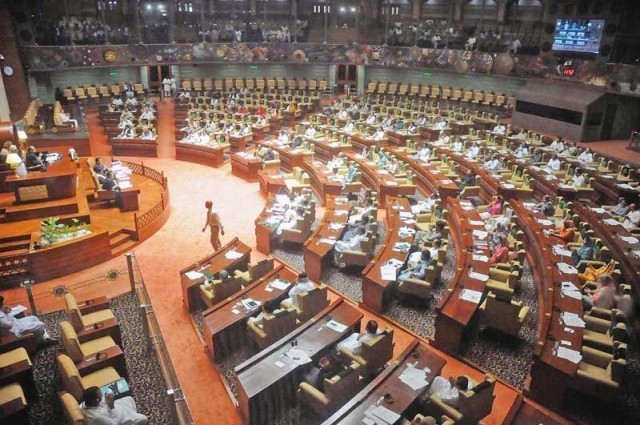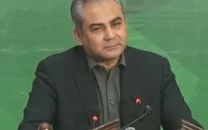Sindh health sector gets a bump in deficit budget
CM Shah unveils Rs1,241.13 budget; health gets a bump in allocation to fight Covid; salaries go up by 5-10%

File photo of Sindh Assembly session.
The Sindh government on Wednesday unveiled a Rs1,241.13 billion deficit budget for the next fiscal year 2020-21, cutting the development outlay and giving a priority to the health sector in the wake of ongoing coronavirus pandemic.
Amidst noisy opposition protest, Chief Minister Syed Murad Ali Shah, who also holds the portfolio of finance minister, presented the budget in the provincial assembly session with Speaker Agha Siraj Durrani in the chair.
The budget showed Rs18.38 billion deficit and contained no new taxes. The government also announced a 10% increase in the salary of government employees from grade 1 to 16 and 5% from grade 17 to 22. The budget documents said that 1,414 employees would be hired in different departments.
According to budget documents, the non-development expenditure is estimated at Rs968.99 billion and the development expenditure at Rs232.9 billion, which is Rs52 billion less than Rs284 billion in the outgoing year (2019-20). The capital expenditure is estimated at Rs39.19 billion.
The actual size of the provincial Annual Development Plan (ADP) for the coming fiscal year is fixed at Rs170 billion, which includes Rs155 billion provincial and Rs15 billion district ADP. The federally-funded projects are estimated at Rs8.30 billion and foreign-funded projects are estimated at Rs54.64 billion.
The total receipts are estimated at Rs1,222.75 billion, including federal receipts of Rs760.30 billion (65%), provincial receipts of Rs313-39 billion (26.8%), capital receipts of Rs25 billion (2.1%) and other receipts (FPA & PSDP) of Rs69.05 billion (5.9%), the chief minister said.
Shah, however, quashed rumours about a new tax in the budget. “No new tax has been introduced in the budget 2020-21 and the increase in non-development expenditure is restricted to 7% only,” he told the house.
Decorum out of the window as cacophonous opposition drowns Chief Minister Murad Ali Shah's budget speech in the #Sindh Assembly.
— The Express Tribune (@etribune) June 17, 2020
For more: https://t.co/p75wx8p94U pic.twitter.com/DgnraSGsVe
According to the budget speech, the increase in non-development expenditure was mainly due to provision of “Covid-related pro-poor” social protection and economic sustainability package of Rs34.2 billion and a rise of Rs19 billion in health sector and Rs22.9 billion in education sector allocations.
“The austerity measures in non-development budget created space for the development budget,” the chief minister said, adding that despite the pandemic challenge, economic slowdown and sluggish revenue targets, the government introduced a “Covid-related pro-poor initiative” with key sectors being social welfare, agriculture, industries and investment.
In the budget, Rs3 billion is earmarked for Poverty Alleviation Programme for Small Business in Urban Areas, Rs2 billion for Poverty Alleviation Program for Small Farmers/Communities in Rural Areas, and Rs20 billion for cash transfer under ‘Sindh Peoples Support Programme’.
PTI govt asked to review budget proposals
In the agriculture sector, the government has allocated Rs3 billion for provision of subsidies to small farmers. It allocated Rs1 billion for subsidy on quality rice seeds, Rs1 billion for fertilisers and Rs1 billion subsidy on pesticides.
Rs5 billion has been allocated for soft loans programme for the small and medium enterprises through the Sindh Bank, Rs 700 million for the support of the information technology interventions and innovative solutions and Rs.500 million for supporting technology-based start-ups – incubators and accelerators.
However, the development budget of agriculture department has been slashed, but the non-development expenditure is increased by 40% to Rs14.84 billion mainly due to subsidy package for small farmers and locust control, for which Rs440 million has been allocated.
In the budget, the government substantially increased allocation for the health sector to counter Covid-19 pandemic and other infectious diseases. The health department budget is raised by 16.1% to Rs139.18 billion, compared to Rs120 billion in the outgoing fiscal year.
Health Risk Allowance at a rate of one basic pay will be provided to all health personnel, including postgraduate and house job officers, engaged in Covid-19 cases from March, 2020, according to the budget documents.
“Last year, the total development portfolio of health budget, including foreign assistance programmes was Rs15 billion. For the next financial year it has been enhanced to Rs23.5 billion,” the chief minister said in his speech.
The chief minister said that the education department’s budget was also augmented by 10.2% to Rs.243.14 billion to promote quality education and to cope up the post-pandemic academic challenges. Grants to local councils were also increased by 5% to Rs78 billion in the next budget, he added
Keeping in view the government priorities, Shah said, the objectives include maximum austerity measures in non-development expenditures, maximum resources for health sector, substantial enlargement of social protection net through increased cash transfers to poverty inflicted people.
Other priorities included employment generation as well as sustaining economic activity for the poorest of the poor in the rural as well as urban areas and continuation of the government’s focus on education through increased allocations.



















COMMENTS
Comments are moderated and generally will be posted if they are on-topic and not abusive.
For more information, please see our Comments FAQ